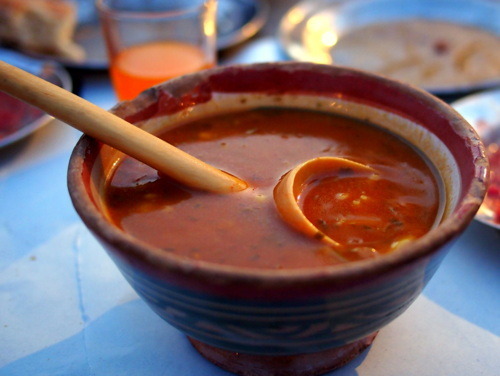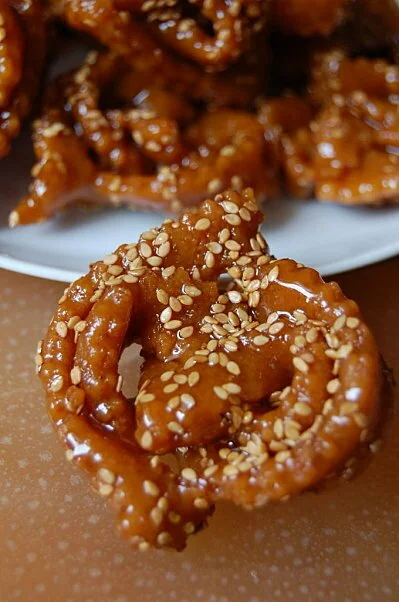When the grumblings of hunger have subsided leaving only the sticky dry swallowing of thirst, you have almost made it to breakfast. We gather around the table in a quiet, calm solidarity. There isn't a lot to discuss. Food and water is on your mind, and food and water is what you'd rather not talk about. 7:00 P.M. comes, and it is time to set the table. Plates and plates of uniform dishes fill every inch of space. We have eaten the same food every day for the month, and it makes them no less mouth watering. 7:25, Glasses are filled with juices, milk, and water. My mind is clear; my voice is soft; my reactions are slow. I feel weak, but also strong, in control, grateful. 7:40, the call to prayer echoes through the town, each mosque playing their part, uniform but separate, calling the same words, Allah Akbar, God is greatest, but with timing, inflections, voices as individual as a fingerprint. The hum of converging loudspeakers bounces off buildings, glides through streets, bursts through windows and crawls into our ears. The sun has set. Eat.
Slowly, we take a date and a glass of milk. We peel our dates carefully and chew fully. We sip deliberately. The sun has set. Eat. My reactions haven't yet met the speed of the food piling up in front of me. The slow return to food leaves me with the momentary feeling of antigravity as the plane pushes you back into your seat before accelerating off the runway. The sun has set. EAT.
Pass the harira. Pass the juice. Pass the sefouf. These are the foods of Ramadan in our corner of Morocco. Recipes included for you to try at home.
The main dish, most crucial, is Harira. It is a Moroccan Tomato, Lentil and Chickpea soup, with other variations throughout the Middle East. This hearty soup hits the spot every time. The recipe above calls for meat, but we have most commonly had it without. It is also usually cooked in a pressure cooker, as the recipe suggests, but can be done in a soup pot.
This recipe is one I would not blame you for not trying at home. Women in our community began months in advance preparing the Sfouf for Ramadan. Buckets and buckets were made to store and draw from each day. This is a pack of energy, a powder of ground sesame seeds, almonds, peanuts, flower, butter, and sugar that is eaten with a spoon. The first few times we tried it, we didn't like it. The texture is interesting, like eating a spoonful of.. of.. something dry and powdery. However, it certainly grows on you. We now can't get enough of it. A family gave us a very large tupperware of sfouf from their storage, and we joked we wouldn't be able to finish it within the year, let alone Ramadan. It was gone in 4 days. A cup of tea and a plate of this turns out to be a perfect midnight snack.
Chebakia, a fried cookie dipped in honey and coated with sesame seeds. A week before Ramadan, we began smelling honey in the air as every household and bakery began making this essential treat. At extreme risk for admitting it, we actually don't love Chebakia. It is a bit too sweet for both of us, but a lot of people love it. Who knows, maybe it will grow on us too when we develop the sugar tolerance of a true Moroccan.
Moroccans bust out the blender for Ramadan. Our breakfasts have had at least 2 types of homemade juice or smoothie each night. Generally, there has been too much sugar added for me to enjoy them fully, but there is one I'll definitely be making again. Avocado, Banana, and Walnut Smoothie. It is amazing.
 |
| Chebakia sellers = beehives |
 |
| Cooking ( Frying) Chebakia |
We have been blessed by and grateful for families in our community that have shared this special part of their lives with us. In the entire month, we have only eaten at our own house a handful of times, being the recipients of a humbling amount of hospitality. Above are photos of some of the Ramadan tables we've sat down to. While other dishes and staples like bread, fried fish, fruits, cakes, etc. depend on the family, here in our town, Ramadan wouldn't be Ramadan without these 4, actually 5, things. The 5th, is that these are all eaten after a long day with family and friends gathered around the table in a collective local and global experience that is remarkable to be a part of. The sun has set. Eat.












1 comments:
Your adventures sound and look amazing. I am so glad you guys are doing this!
Post a Comment